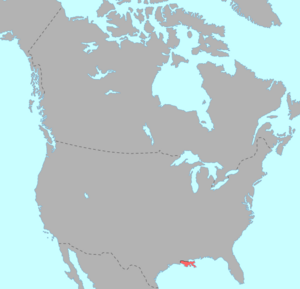Chitimacha language facts for kids
Quick facts for kids Chitimacha |
|
|---|---|
| Sitimaxa Čitimaaša |
|
| Pronunciation | t͡ʃitimaːʃa |
| Native to | USA |
| Region | Southern Louisiana |
| Ethnicity | Chitimacha |
| Extinct | 1940e18 with the death of Delphine Ducloux |
| Language family |
Language isolate
(possibly Totozoquean?) |

Distribution of Chitimacha language
|
|
Chitimacha (/ˌtʃɪtɪməˈʃɑː/ CHIT-i-mə-SHAH or /tʃɪtɪˈmɑːʃə/ chit-i-MAH-shə, Sitimaxa) is a language isolate historically spoken by the Chitimacha people of Louisiana, United States. It became extinct in 1940 with the death of the last fluent speaker, Delphine Ducloux.
Although no longer spoken, it is fairly extensively documented in the early 20th-century work (mostly unpublished) of linguists Morris Swadesh and John R. Swanton. Swadesh in particular wrote a full grammar and dictionary, and collected numerous texts from the last two speakers, although none of this is published.
Language revitalization efforts are underway to teach the language to a new generation of speakers. Tribal members have received Rosetta Stone software for learning the language. As of 2015, a new Chitimacha dictionary is in preparation, and classes are being taught on the Chitimacha reservation.
Classification
Chitimacha has recently been proposed to be related to, or a member of, the hypothetical Totozoquean language family. An automated computational analysis (ASJP 4) by Müller et al. (2013) found lexical similarities between Chitimacha, Huave, and Totozoquean.
However, since the analysis was automatically generated, the grouping could be either due to mutual lexical borrowing or genetic inheritance.
An earlier, more speculative, proposal suggested an affinity with the also hypothetical group of Gulf languages.
Phonology
Brown, Wichmann, and Beck (2014) give the following phoneme inventory based on Morris Swadesh's 1939 analysis.
Consonants
| Bilabial | Alveolar | Post- alveolar |
Palatal | Velar | Glottal | ||
|---|---|---|---|---|---|---|---|
| Plosive | normal | p | t | k | ʔ | ||
| glottalized | pʼ | tʼ | kʼ | ||||
| Nasal | m | n | |||||
| Fricative | s | ʃ | h | ||||
| Affricate | normal | t͡s | t͡ʃ | ||||
| glottalized | t͡sʼ | t͡ʃʼ | |||||
| Approximant | w | j | |||||
Vowels
| Front | Central | Back | |
|---|---|---|---|
| Close | i iː | u uː | |
| Mid | e eː | ə | o oː |
| Open | a aː |
Orthography
Transcription has been done by researchers in a number of orthographies, including French, Spanish, and Americanist. Members of the Chitimacha tribe have developed a practical orthography using the Latin alphabet which does not use diacritics or special characters. It retains elements of the orthography earlier used by Morris Swadesh.
Grammar
Chitimacha has a grammatical structure which is not dissimilar from modern Indo-European languages but it is still quite distinctive. Chitimacha distinguishes several word classes: verbs, nouns, adjectives (verbal and nominal), quantifiers, demonstratives. Swadesh (1946) states that the remaining word classes are hard to distinguish but may be divided "into proclitics, postclitics, and independent particles". Chitimacha has auxiliaries which are inflected for tense, aspect and mood, such as to be. Polar interrogatives may be marked with a final falling intonation and a clause final post-position.
Chitimacha does not appear to have adopted any grammatical features from their interactions with the French, Spanish or Americans.
Pronouns
Verbs are inflected for person and number of the subject. Ambiguity may be avoided by the use of the personal pronouns (shown in the table below), but sentences without personal pronouns are common. There is no gender in the personal pronouns and verbal indexes. Subject and object personal pronouns are identical.
| singular | plural | |
|---|---|---|
| 1st person | qix [ʔiš] |
qux [ʔuš] |
| 2nd person | him(q) [himʔ] |
was [was] |
| 3rd person | hus [hus] |
hunks [hunks] |
Pronouns are more restricted than nouns when appearing in a possessive construction. Pronouns cannot be proceeded by a possessive unlike nouns.
Nouns
There are definite articles in Chitmacha. Nouns are mostly uninflected, there are only approximately 30 nouns (mostly kinship or referring to persons) which distinguish a singular or plural form through a plural suffix or other formations.
Nouns are free, or may be possessed by juxtaposing the possessor and the possessed noun.
ʔiš ʔinž̹i = my father ("I father")
was ʔasi ʔinž̹i = that man's father ("that man father")
Sample Sentences
The following sentences and translations are from the book "Modern Chitimacha (Sitimaxa)" (2008), endorsed by the Chitimata Tribal government's Cultural Department.
Qix
My
susbi
gun
qix
my
gãmpi
ammunition
nẽ
and
gaptk,
taking,
huupup
lake+to
cuug,
going,
huutãnki
boat-in
nahpiig,
over-crossing
gastãnk
north
hup
to
nãxmiig
hunting
cuug,
going,
juqunk
soon
kãmcin
deer
getiki
I+struck
"Taking my gun and my ammunition and going toward the lake, I crossed over in a boat and hunted toward the north, where I soon killed a deer"
We
That
nux
stone
gaptk,
taking,
him
your
susbi
gun
wey
that
hix
with
hi
thither
kaatẽmiig,
rubbing,
wetk
then
nãxmiig
hunting
cuucuux,
if+you+go,
qaxtkãnki
then
qoonãk
soon
qun
some
kun
thing
getsuy
you+will+kill
"If you take that stone and rub your gun with it and then go hunting, you will soon kill something"
Hãnã
House
hup
to
cuyqi,
he+went
nẽncuu
too
waaksti
late
hi
thither
qehiqi
he+arrived
"He went to the house, but he arrived too late"
See also
 In Spanish: Idioma chitimacha para niños
In Spanish: Idioma chitimacha para niños

